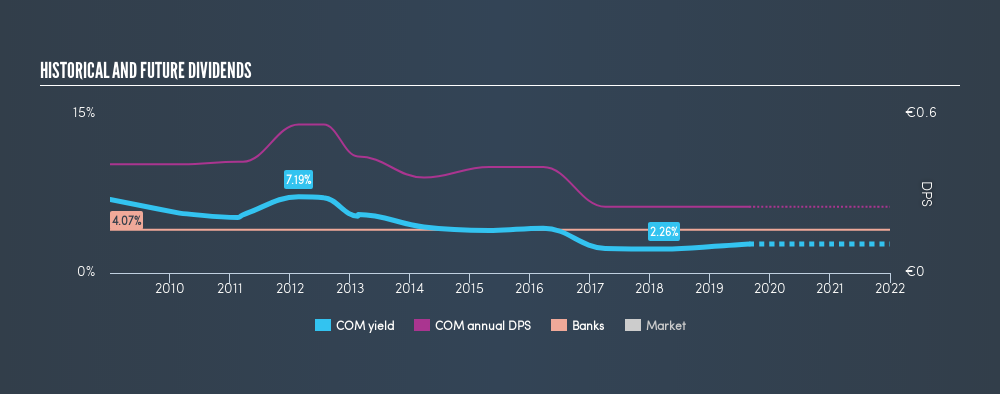
Could comdirect bank AG (ETR:COM) be an attractive dividend share to own for the long haul? Investors are often drawn to strong companies with the idea of reinvesting the dividends. If you are hoping to live on the income from dividends, it's important to be a lot more stringent with your investments than the average punter.
A slim 2.7% yield is hard to get excited about, but the long payment history is respectable. At the right price, or with strong growth opportunities, comdirect bank could have potential. Some simple analysis can offer a lot of insights when buying a company for its dividend, and we'll go through this below.
Click the interactive chart for our full dividend analysis

Payout ratios
Companies (usually) pay dividends out of their earnings. If a company is paying more than it earns, the dividend might have to be cut. As a result, we should always investigate whether a company can afford its dividend, measured as a percentage of a company's net income after tax. In the last year, comdirect bank paid out 108% of its profit as dividends. A payout ratio above 100% is definitely an item of concern, unless there are some other circumstances that would justify it.
Dividend Volatility
From the perspective of an income investor who wants to earn dividends for many years, there is not much point buying a stock if its dividend is regularly cut or is not reliable. comdirect bank has been paying dividends for a long time, but for the purpose of this analysis, we only examine the past 10 years of payments. The dividend has been cut by more than 20% on at least one occasion historically. During the past ten-year period, the first annual payment was €0.41 in 2009, compared to €0.25 last year. The dividend has shrunk at around 4.8% a year during that period. comdirect bank's dividend hasn't shrunk linearly at 4.8% per annum, but the CAGR is a useful estimate of the historical rate of change.
We struggle to make a case for buying comdirect bank for its dividend, given that payments have shrunk over the past ten years.
Dividend Growth Potential
With a relatively unstable dividend, it's even more important to see if earnings per share (EPS) are growing. Why take the risk of a dividend getting cut, unless there's a good chance of bigger dividends in future? comdirect bank's EPS have fallen by approximately 12% per year. With this kind of significant decline, we always wonder what has changed in the business. Dividends are about stability, and comdirect bank's earnings per share, which support the dividend, have been anything but stable.
Conclusion
Dividend investors should always want to know if a) a company's dividends are affordable, b) if there is a track record of consistent payments, and c) if the dividend is capable of growing. comdirect bank is paying out a larger percentage of its profit than we're comfortable with. Earnings per share are down, and comdirect bank's dividend has been cut at least once in the past, which is disappointing. With any dividend stock, we look for a sustainable payout ratio, steady dividends, and growing earnings. comdirect bank has a few too many issues for us to get interested.
Given that earnings are not growing, the dividend does not look nearly so attractive. See if the 3 analysts are forecasting a turnaround in our free collection of analyst estimates here.
Looking for more high-yielding dividend ideas? Try our curated list of dividend stocks with a yield above 3%.
We aim to bring you long-term focused research analysis driven by fundamental data. Note that our analysis may not factor in the latest price-sensitive company announcements or qualitative material.
If you spot an error that warrants correction, please contact the editor at editorial-team@simplywallst.com. This article by Simply Wall St is general in nature. It does not constitute a recommendation to buy or sell any stock, and does not take account of your objectives, or your financial situation. Simply Wall St has no position in the stocks mentioned. Thank you for reading.
Market Insights
Community Narratives



